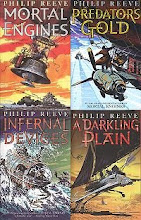
A Brave New World by Aldous Huxley in 1932 falls into the same 'category' (if you will) of fiction as 1984 and Clockwork Orange, discussing the flaws within our current society and the flaws of a possible future society. Set a few hundred years into the future and primarily within London, a new world is created which is based upon stripping away natural humanity and replacing it with clones of people who believe that 'everyone belongs to everyone else'. Feotuses are conditioned in a factory - before being 'decanted' out of bottles instead of born - to be content within the 'caste' that they are born into (alpha, beta, gamma or delta) and the work that they have to do as a result. Thus those who are born as deltas have their intellectual growth stunted and 'hypnopedia' (repeating government slogans in their sleep) is used to condition them into loving their position in life.
Ofcourse within this new world there are some exceptional people who do not fit within this 'Utopia' and it follows primarily Bernard Marx who finds that even though he was conditioned to be an 'alpha plus' is in fact inferior to the others of his caste. Huxley's choice of name for Bernard is unfortunately obvious in its reference towards Karl Marx and Marxism of the time (a framework of thinking that lead to communism) which is off putting when reading the book. The same can also be said for the main female within the book Lenina Crowne (who shares her name with Russian communist and revolutionist Valdimir Lenin) and indeed many of the other characters. However I feel that their names are not the only problem. These two characters are decidedly unlikeable as main characters go. Bernard Marx offers the reader no confidence within his thoughts and actions as they seem to be simply and inexorably to try and prove himself. But to who? This is also highlighted by another character Helmholtz Watson who is strong, also isolated and more intellectual insitive it seems. Perhaps this is to gain more sympathy from the reader towards Marx or is for some unseen plot device or twist. Lenina is also disappointing, particularly from a feminist point of view, as being one of the few main women she offers no strong character to latch on to and to make you think. Personally she is rather infuriating in her conformity to society and merely tries to tantalize the reader with her potential for being revelutionary.
Having not yet finished the book I realise that the views that I have may well change depending on how Huxley puts across his views of this society, however I feel it brings up some interesting questions about society. To me it is most certainly a dystopian society. Even though all intentions are to create a contented and efficient society the sacrifice is too great: humanity extinct; emotions extinct; the individual extinct. Additionally, although the people are kept 'happy' is happiness not the flip side to unhappiness? Therefore, with the absence of unhappiness would happiness not just become obselete as well? No longer happiness but a 'nothingness'? Could we sacrafice our emotions (and consequently our life experiences) to rid the world of suffering?
Despite some prejudices I am enjoying the book for its explorative ideas, but wonder if it isn't as successful as 1984 as it is further from the contemporary society and therefore loses its shock value.













1 comment:
David W.
I agree Claire- the book is a bit sort of obvious for me, especially all the names. It feels like Huxley is talking down to you all the time. I think 1984 is more interesting as a vision of the future, and so much of what Orwell predicted is just part of everyday life now. A Clockwork Orange is better than both of them though- it's just a much better novel and the tricks Burgess plays on you and the way he gets you into Alex's mind and makes you sympathise with him even though he's a total psycho is quite disturbing!
Post a Comment